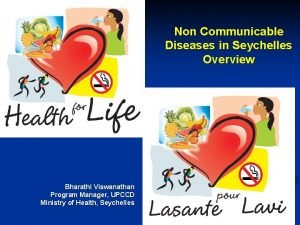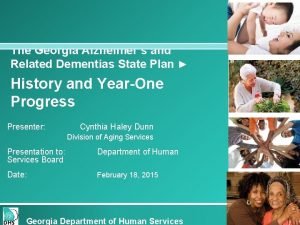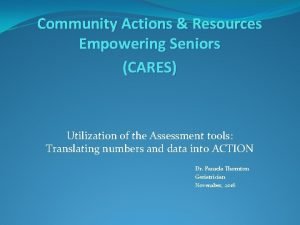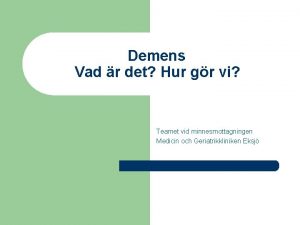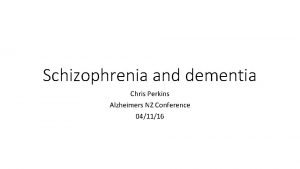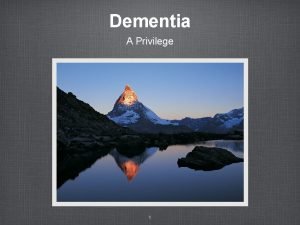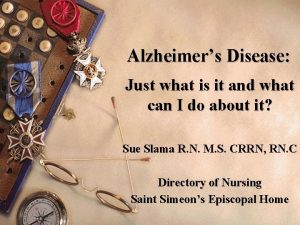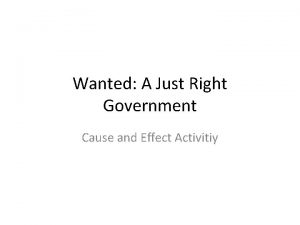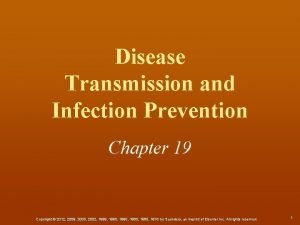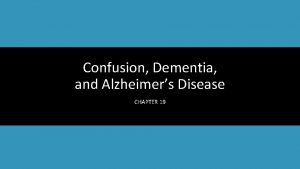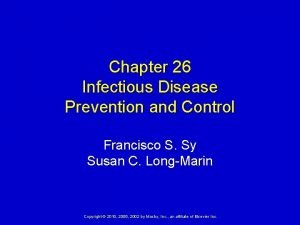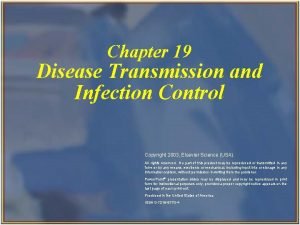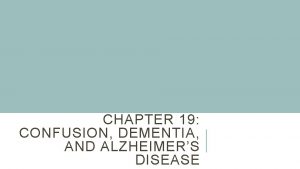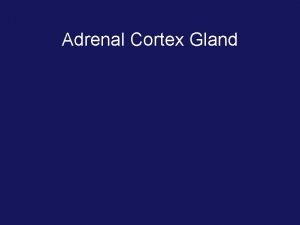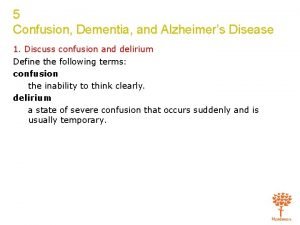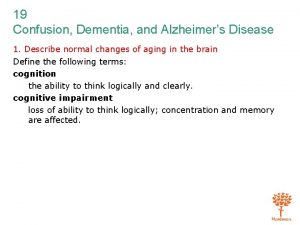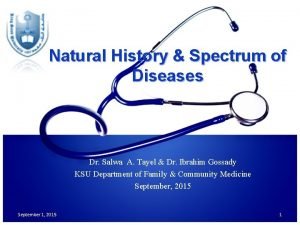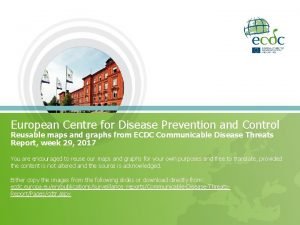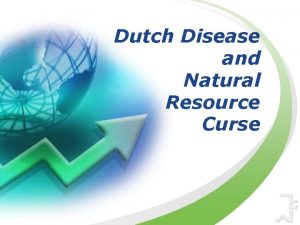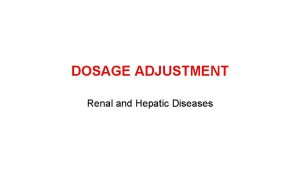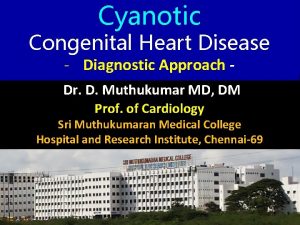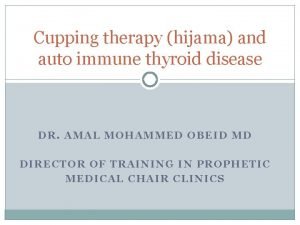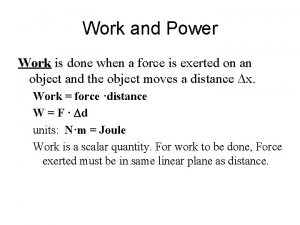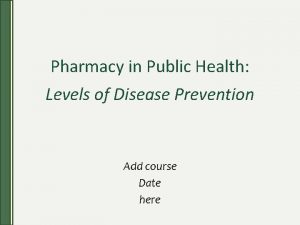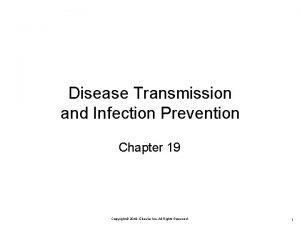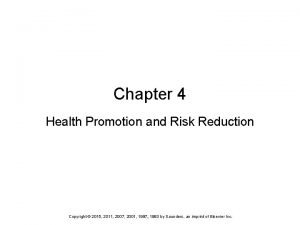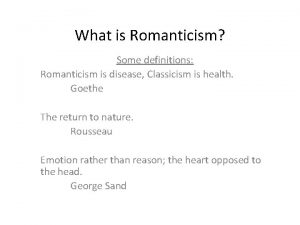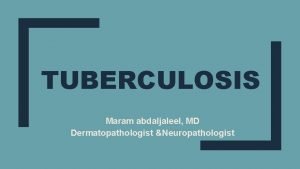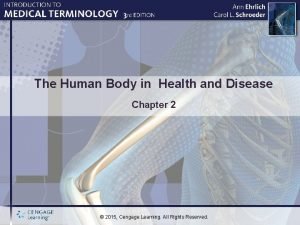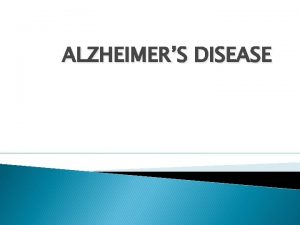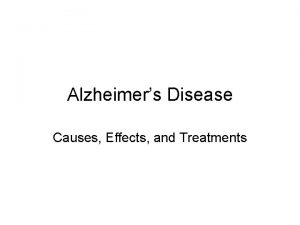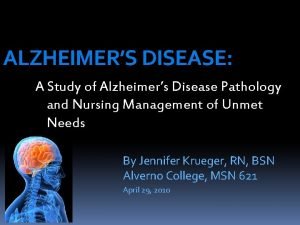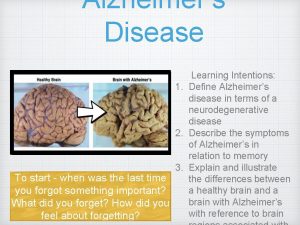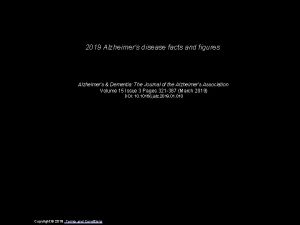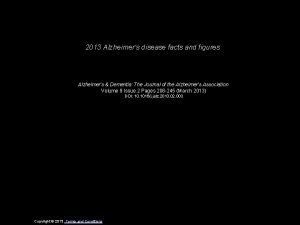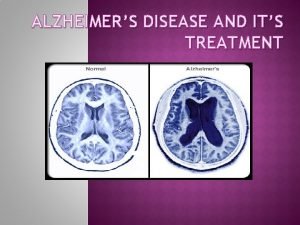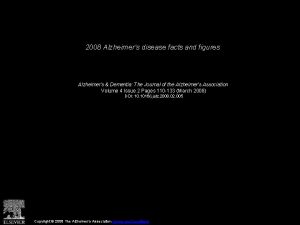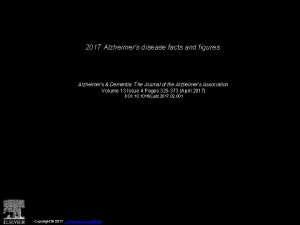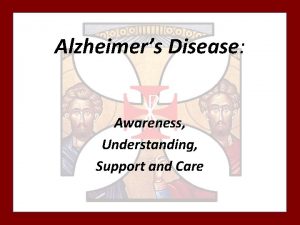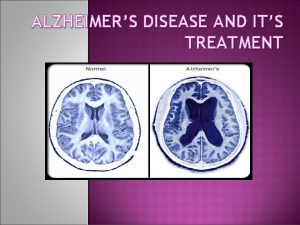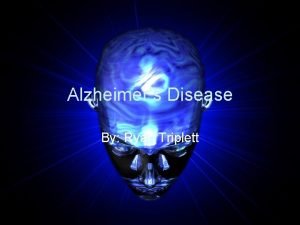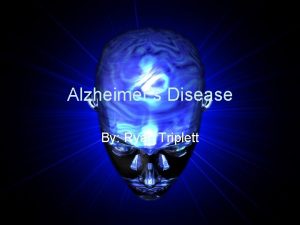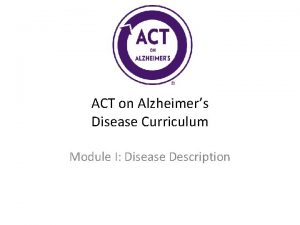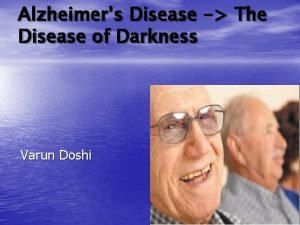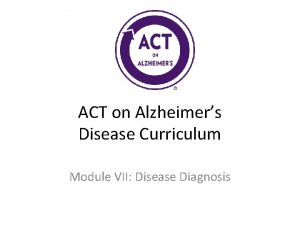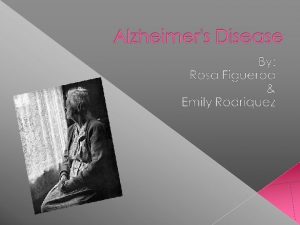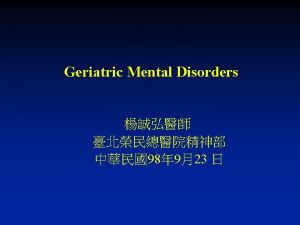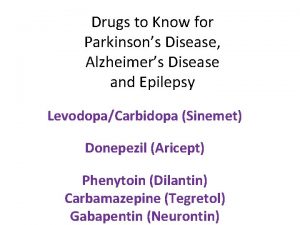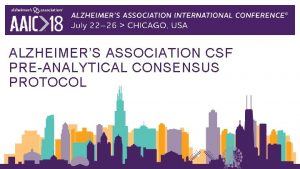Alzheimers Disease Just what is it and what













































- Slides: 45

Alzheimer’s Disease: Just what is it and what can I do about it? Sue Slama R. N. M. S. CRRN, RN. C Directory of Nursing Saint Simeon’s Episcopal Home

ALZHEIMER’S EYE TEST w Count every “F” in the following text: – FINISHED FILES ARE THE RESULT OF YEARS OF SCIENTIFIC STUDY COMBINED WITH THE EXPERIENCE OF YEARS…. – How many “Fs” did you find?

ALZHEIMER’S EYE TEST w There are 6– no joke. Read it again w Most people find 3. Some find 4. Rarely do people find 6. The brain does not process “OF”.

What Is Dementia? v. A lot of people experience memory lapses. Some lapses are serious, others are not.

What Is Dementia? v. People who present with serious changes in their memory and or personality and behavior may suffer from one of many diseases that result in dementia. v. The term dementia describes a group of symptoms that are caused by brain dysfunction.

Dementia Symptoms May Include: v Asking the same question repeatedly v Becoming lost in familiar places v Being unable to follow directions v Getting disoriented about time, people, an places v Neglecting personal safety, hygiene, and nutrition

Causes of Dementia v People with dementia lose their abilities at different rates. v Dementia is caused by many different conditions or diseases. v Some of these can be reversed, others cannot be reversed.

Causes of Dementia v Reversible conditions could be: – – – High fever Dehydration Vitamin deficiency Poor nutrition Bad reactions to medicine Problems with the thyroid gland

Diseases that can cause Dementia v Parkinson’s Disease v Supra Nuclear Palsy v Lewy Body Disease v Alzheimer’s Disease v Chronic Alcoholism v Vascular Disease v Pick’s Disease v Mixed Disease

Two Most Common Causes of Dementia v Alzheimer’s disease v These types of dementia are v Multi infarct -dementia irreversible– they can not be cured. (vascular dementia)

Multi Infarct Dementia or Vascular Dementia v In vascular dementia, a series of small strokes or changes in the brain’s blood supply may result in the death of the brain tissue. v The location in the brain where the small strokes occur determines the seriousness of the problem and the symptoms. v Symptoms that begin suddenly may be a sign of this kind of dementia. v People with this type of dementia are likely to show signs of improvement or remain stable for long periods of time, then quickly develop new symptoms of more strokes occur. v In many folks, high blood pressure is to blame.

Alzheimer’s Disease Just What Is It? v Dementia was first described by a German physician, Alosi Alzheimer. v Post mortem, studies characterized senile plaques and neuro fibrillary tangles in the cerebral cortex. v Senile plaques are extra v Observed in a 51 year old cellular accumulation of beta female patient with -amyloid memory loss, disorientation, an v Neuro fibrillary tangles are hallucinations. intracellular strands of nerve bundles


Brain With Alzheimer's Disease

Brain With Alzheimer's Disease

The Long Goodbye v Known by many as "the long goodbye, " Alzheimer's disease is increasing at an alarming rate in the United States. v An estimated 5 million people in the United States are now living with Alzheimer's, and someone is diagnosed with the disease every 72 seconds.

The Long Goodbye v Typically, People with Alzheimer's are age 65 or older, but at least 200, 000 people under the age of 65 are also living with an early-onset form of the disease. Nearly half of individuals over the age of 85 have Alzheimer’s disease. v By the year 2030, the number of individuals with Alzheimer's could approach 8 million; v. If scientists can't find a way to cure or prevent Alzheimer's, this number could range between 11 million and 16 million by the year 2050.

Alzheimer’s Disease v Majority of the dementias 60 -80% v 6 th leading cause of death in the US-no cure. v 5 th leading cause of death over the age of 65 v $ 148 billion spent annually v Untold personal and family costs v No one is unaffected by this disease

What's the Average Life Expectancy of Someone With Alzheimer's? v It's hard to gauge an individual's life expectancy based solely on the stage of Alzheimer's. That's partly because the length of each stage (early/middle/late) (mild/moderate/severe) can vary greatly from individual to individual. v Average life expectancy after diagnosis is 8 -10 years v Some people live 15 or more years after diagnosis, including many years with relatively mild impairment, while others decline rapidly and die within a few years of being diagnosed.

Stages of AD - Progressive Deterioration v. Mild Cognitive Impairment v. Early or Mild v. Middle or Moderate v. Late of Severe

Stages of Alzheimer’s Disease v. Mild Cognitive Impairment (MCI) – Usually only affects memory – Other cognitive abilities remain intact – No functional disability

Symptoms of Early of Mild AD v Confusion about the location of familiar places (getting lost begins to occur) v Taking longer to accomplish normal daily tasks v Trouble handling money and paying bills v Poor judgment leading to bad decisions v Loss of spontaneity and sense of initiative v Mood and personality change, increased anxiety v Memory Loss v Short term loss

Symptoms of Middle or Moderate AD v Increasing memory loss an confusion v Short term loss v Long term loss v File cabinet v Shortened attention span problems recognizing problems with reading, writing, working with numbers v Difficulty organizing thoughts and thinking logically v Inability to learn new things or to cope with new or unexpected situations v Restlessness, agitation, anxiety, tearfulness, wandering – especially late in the afternoon or at night (sundowning)

Symptoms of Middle or Moderate AD v Repetitive statements or movement, occasional muscle twitches v Hallucinations, delusions, suspiciousness or paranoia, irritability v Yelling out v Loss of impulse control (shown through sloppy table manners, undressing at inappropriate times or places, or vulgar language) v Perceptual-motor problems (such as trouble getting out of a chair or setting the table)

Symptoms of Late or Severe AD v Lack of recognition of v Seizures, skin infections, difficulty swallowing family members an loved ones v Inability to communicate in anyway v Weight Loss v Groaning, moaning, or grunting v Increased sleeping v Lack of bladder and bowel control

Symptoms of Late or Severe AD v At the end of the disease, most people die from illness, frequently aspiration pneumonia. v This type of pneumonia happens when a person is not able to swallow properly. v The person will breath food or liquids into the lungs.

Medical Treatment v What will treatment do? – Delay cognitive and functional loss – Improve behavior symptoms – Not everyone benefits v When to start treatment? – When cognitive impairment affects daily function – When behavioral symptoms affect daily function

Medical Treatment v Tendency is to be more aggressive when the individual lives at home or in assisted living. v Late stage or severe dementia – Benefits are limited at best v Continued decline – Sometimes families are unsure of benefits of medications and will want to try without the medications. v If medications stop and are then restarted, they may or may not decline with the stop but will not gain prior functional level with the restart of the medications

Medical Treatment v Aricept- pill dissolving tablet v Exelon- pill, patch. Liquid v Razadyne- pill, ER, liquid v Namenda- pill v DBS- TRIALS

End Of Life Decisions v Discussions need take place in early stages of the disease if not before. – AD • Treatment-feeding tubes, hospitalizations, etc. – DNR v Too often these conversations don’t happen within families until the person is in the late stage of the disease, then, one is really honoring the family’s directions, not the individual's wishes.

Care Giver Burden & Stress v “Caregiver” is defined as: A person who cares for the physical, nutritional, social, spiritual and financial needs of a loved one.

Care Giver Burden & Stress v Caring for a person with AD or other dementias is often very difficult and many family or other unpaid caregivers experience high levels of emotional stress and depression as a result.

Care Giver Burden & Stress v Care giving may also have a negative impact on the health, employment, income and financial security of the caregivers. v Risk of mortality is greatly increased for the caregiver.

Social Issues and Alzheimer’s v Wandering v Incontinence v Agitation v Aggression v Inappropriate sexual behavior v Insomnia v Help – Local Alzheimer’s Association • 6455 S. Yale Ave • Tulsa, Ok 74136 • 1 -800 -2723900 v Saint Simeon’s • Dotson Assisted Living Center- 4 levels of care including Memory Support • Memory Center • Health Care Center • 918 425 -3583

Increased Risk Factors for AD v Diabetes v B 12 deficiency v Depression v Genetics v Down’s syndrome v Head trauma v Smoking v Low social support v Never married

Prevention Currently there is no evidence of even moderate scientific quality to support any modifiable factors associated with the reduction of AD.

Some Good News While some factors , such as genetics, may be out of your control, many powerful lifestyle factors are within your sphere of influence

Six Pillars of Brain Healthy Lifestyle v. Brain Healthy Diets v Eat across the rainbow- fruit and vegetable v Lean Proteins v Health fats-Omega 3 fats v Treat yourself with a glass of red wine and dark chocolate v Green Tea v Avoid- red meats, fast and fried foods, packaged and process foods v Light to moderate alcohol consumption v Supplements v. Folic acid, Vit B 12, Vit D, magnesium, and fish oil are believed to help preserve brain health

Six Pillars of Brain Healthy Lifestyle v Regular Exercise v Helps reduce stress v Boosts Mood v Improve circulation-improves memory v Increases energy v. Aim for 30 minutes 5 x per week- anything that gets your rate up v. For those over age 65 adding 2 -3 strength exercises weekly may cut your risk in half. v. Include balance and coordination exercises v. Stick with it

Six Pillars of Brain Healthy Lifestyle v Mental Stimulation v Learn something new v. Foreign language v. Musical instrument v. Strategy games and riddles v. Practice memorization v. Practice the 5 W’s- who, what , where, when, why Acting like a detective keeps the neurons firing v. Follow the road less traveled v. The greater the challenge the better

Six Pillars of Brain Healthy Lifestyle v. Quality Sleep v. Establish a regular sleep schedule v. Reinforces the circadian rhythms. You brain responds to regality v. Be smart about napping v. Create a relaxing bedtime ritual v. Quiet the inner chatter

Six Pillars of Brain Healthy Lifestyle v. Manage Stress v. Breathe! v. Schedule daily relaxation activities-make relaxation a priority v. Nourish the inner peace v. Regular meditation, prayer, spiritual activities

Six Pillars of Brain Healthy Lifestyle v. An Active Social Life v. Studies show the more connected we are the better we do on memory and cognitive testing. v. Volunteer v. Join a club or social group v. Reach out over the phone v. Get to know your neighbors v. Make weekly date with a friend v. Get out

Closing Remarks v There is currently no cure for Alzheimer’s disease, though some medications can slow the progression of the disease. There are now some things we can do to help prevent the disease. There is hope for significant break through with continued research in AD. We must continue to fight for the answers or suffer the consequences as the Baby Boomers march into their golden years and the cost will only sky rocket.

Thank you inviting me and for your attention. Any Questions?
 Bharathi viswanathan
Bharathi viswanathan Georgia alzheimers planning
Georgia alzheimers planning Fast scale for dementia
Fast scale for dementia Vaskulär demens
Vaskulär demens Alzheimers nz conference 2020
Alzheimers nz conference 2020 Historical research
Historical research Alzheimers society contented dementia
Alzheimers society contented dementia Alzheimers eye test joke
Alzheimers eye test joke Did paris love juliet?
Did paris love juliet? Wanted a just right government worksheet
Wanted a just right government worksheet Present tense examples in hindi
Present tense examples in hindi Please miss
Please miss Let just kiss and say goodbye
Let just kiss and say goodbye Chapter 35 immune system and disease
Chapter 35 immune system and disease Puncture resistant container
Puncture resistant container Confusion dementia and alzheimer disease chapter 19
Confusion dementia and alzheimer disease chapter 19 Chapter 26 infectious disease prevention and control
Chapter 26 infectious disease prevention and control Chapter 19 disease transmission and infection prevention
Chapter 19 disease transmission and infection prevention Chapter 19 confusion dementia and alzheimer's disease
Chapter 19 confusion dementia and alzheimer's disease Cushing before and after
Cushing before and after Confusion dementia and alzheimer's disease
Confusion dementia and alzheimer's disease If a resident with ad shows violent behavior the na should
If a resident with ad shows violent behavior the na should Hans full is pulling on a rope to drag
Hans full is pulling on a rope to drag Present perfect with just already yet
Present perfect with just already yet Natural history and spectrum of disease
Natural history and spectrum of disease If you confess he is faithful to forgive
If you confess he is faithful to forgive European centre for disease prevention and control
European centre for disease prevention and control Rain falls on the just and the unjust ecclesiastes
Rain falls on the just and the unjust ecclesiastes Resource curse and dutch disease
Resource curse and dutch disease Maintenance dose formula
Maintenance dose formula Difference between cyanotic and acyanotic heart disease
Difference between cyanotic and acyanotic heart disease Thyroid cupping
Thyroid cupping Hans full is pulling on a rope to drag
Hans full is pulling on a rope to drag How does a plant resist disease and pests journey 2050
How does a plant resist disease and pests journey 2050 Journey 2050 student handout 3 crossword puzzle
Journey 2050 student handout 3 crossword puzzle Health promotion and levels of disease prevention
Health promotion and levels of disease prevention Decode
Decode Chapter 19 disease transmission and infection prevention
Chapter 19 disease transmission and infection prevention Health promotion and levels of disease prevention
Health promotion and levels of disease prevention Romanticism is disease classicism is health
Romanticism is disease classicism is health Wanted: a just right government
Wanted: a just right government A just right government cause and effect
A just right government cause and effect Wanted:a just right government
Wanted:a just right government Wanted a just right government cause and effect
Wanted a just right government cause and effect Robbins and cotran pathologic basis of disease
Robbins and cotran pathologic basis of disease The human body in health and disease chapter 2 answer key
The human body in health and disease chapter 2 answer key
